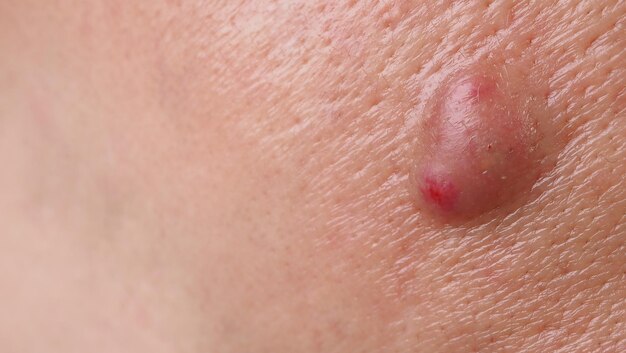Ask Ayurvedic doctor a question and get a consultation online on the problem of your concern in a free or paid mode. More than 2,000 experienced doctors work and wait for your questions on our site and help users to solve their health problems every day.
Vidradhi in Ayurveda – Natural Ayurvedic Solutions for Abscess Management

Introduction to Vidradhi in Ayurveda
Vidradhi in Ayurveda refers to the development of abscesses or boils resulting from imbalances in the body’s doshas. In traditional Ayurvedic texts, vidradhi is described as a condition where toxins accumulate and manifest as localized infections. By understanding vidradhi in Ayurveda, one can appreciate the holistic approach that emphasizes detoxification, balancing of doshas, and the use of potent herbal remedies to promote healing and restore equilibrium.
Don't wait or self medicate. Start chat with Doctor NOW
Historical Roots & Ayurvedic Perspective
Ancient Ayurvedic literature highlights vidradhi in Ayurveda as a manifestation of imbalanced bodily humors, particularly aggravated Pitta and Kapha. Historical texts detail that when the body’s natural detoxification processes are disrupted, toxins (ama) accumulate, leading to the formation of abscesses. This condition is not only seen as a physical ailment but also as a reflection of internal disharmony that requires a comprehensive treatment approach.
Understanding the Causes & Pathogenesis
Vidradhi in Ayurveda is believed to arise from several interrelated factors:
- Dosha Imbalance: Predominantly, an aggravated Pitta dosha leads to inflammatory responses, while an imbalance in Kapha contributes to the accumulation of toxins.
- Ama (Toxins): Improper digestion and metabolism result in the formation of ama, which settles in tissues and forms niduses for infection.
- Lifestyle & Diet: Unhealthy eating habits, stress, and environmental factors further exacerbate the condition by disrupting the body’s natural equilibrium.
Key Ayurvedic Treatments for Vidradhi
Herbal Remedies & Detoxification
Ayurveda offers a range of herbal formulations and therapies for vidradhi in Ayurveda. Some of the key remedies include:
- Herbal Pastes (Lepas): Formulated with herbs such as Neem, Turmeric, and Manjistha, these pastes are applied externally to reduce inflammation and promote drainage.
- Internal Detoxifiers: Herbs like Guduchi and Triphala help cleanse the system, reduce toxin load, and restore doshic balance.
- Panchakarma Therapies: Specialized detoxification treatments, including Virechana (purgation) and Raktamokshana (bloodletting), are sometimes recommended to eliminate deep-seated toxins and manage severe cases of vidradhi.
Mechanism of Action
The therapeutic effects of Ayurvedic treatments for vidradhi in Ayurveda are attributed to their anti-inflammatory, antimicrobial, and detoxifying properties. By stimulating digestion and enhancing metabolic processes, these remedies facilitate the elimination of toxins. Simultaneously, their cooling and soothing effects help pacify aggravated Pitta dosha, reducing inflammation and promoting tissue healing.
Lifestyle Modifications & Dosha Balancing
Managing vidradhi in Ayurveda also involves adopting lifestyle and dietary changes:
- Dietary Adjustments: Incorporate cooling, easily digestible foods and avoid spicy, oily, and processed foods that aggravate Pitta.
- Stress Management: Practices such as yoga and meditation help maintain mental equilibrium, which is crucial for overall doshic balance.
- Hygiene & Wound Care: Maintaining proper hygiene and following wound care protocols prevent secondary infections and support the healing process.
Recommended Usage & Precautions
When treating vidradhi in Ayurveda, it is essential to:
- Consult a Certified Ayurvedic Practitioner: Personalized guidance ensures that the treatment is tailored to your unique constitution (Prakriti) and severity of the condition.
- Follow Prescribed Dosages: Adhering to the recommended dosages for herbal formulations is crucial to avoid potential side effects.
- Monitor the Healing Process: Regular follow-ups help track improvements and adjust treatment as needed.
Frequently Asked Questions
How is vidradhi in Ayurveda diagnosed?
Diagnosis of vidradhi in Ayurveda involves a detailed examination of the patient’s doshic balance, digestive health, and lifestyle factors. Practitioners assess the site, size, and characteristics of the abscess along with a comprehensive evaluation of systemic symptoms.
What are the primary causes of vidradhi in Ayurveda?
The main causes include an imbalance of Pitta and Kapha doshas, accumulation of ama (toxins), and external factors such as poor diet, stress, and inadequate hygiene. These factors collectively contribute to the formation of abscesses.
Which Ayurvedic herbs are most effective in treating vidradhi?
Herbs like Neem, Turmeric, Manjistha, Guduchi, and Triphala are commonly used for vidradhi in Ayurveda. These herbs possess potent anti-inflammatory, antimicrobial, and detoxifying properties that help resolve abscesses and restore balance.
Can lifestyle changes help manage vidradhi in Ayurveda?
Absolutely. Incorporating a balanced diet, stress reduction techniques, and proper hygiene practices can significantly complement Ayurvedic treatments and prevent the recurrence of vidradhi.
Is Panchakarma recommended for severe cases of vidradhi?
Yes, Panchakarma therapies, especially Virechana and Raktamokshana, may be recommended in severe cases to eliminate deep-seated toxins and restore doshic equilibrium. However, these treatments should be administered under expert supervision.
How long does it take to see improvements in vidradhi with Ayurvedic treatment?
The duration varies depending on the severity of the condition and individual constitution. While some patients may notice improvements within a few weeks, others might require a longer duration of treatment and lifestyle modifications for complete healing.
Are there any side effects associated with Ayurvedic treatment for vidradhi?
When prescribed and administered correctly, Ayurvedic treatments for vidradhi in Ayurveda are generally safe. However, some individuals might experience mild digestive disturbances during detoxification. It is important to follow professional guidance and report any adverse reactions promptly.
Conclusion & Expert Insights
Vidradhi in Ayurveda represents a condition where ancient wisdom meets modern challenges. Through a combination of herbal remedies, detoxification therapies, and lifestyle modifications, Ayurveda offers a comprehensive approach to managing abscesses. By addressing the root causes of doshic imbalance and toxin accumulation, Ayurvedic treatments provide a natural, holistic pathway to healing and well-being. Always consult with a certified Ayurvedic practitioner to tailor the treatment to your specific needs and ensure a safe and effective recovery.
References & Further Reading
- Sharma, P.V. (1995). Ayurvedic Healing: A Comprehensive Guide.
- Lad, V. (2002). Ayurveda: The Science of Self-Healing.
- National Institute of Ayurveda:
- Journal of Ayurveda and Integrative Medicine for research articles on Ayurvedic detoxification and healing therapies.



